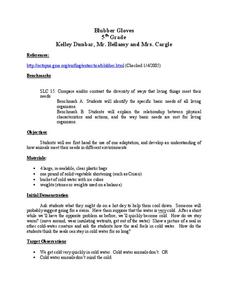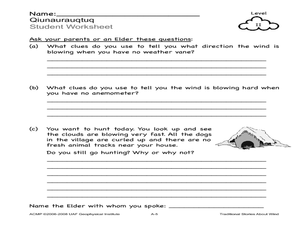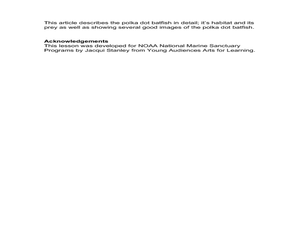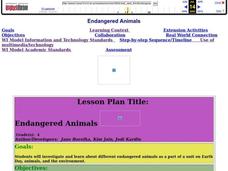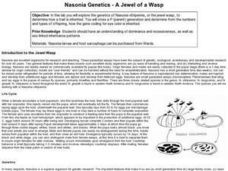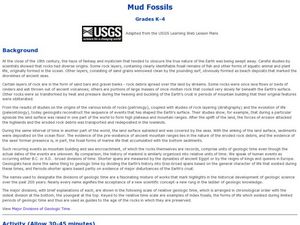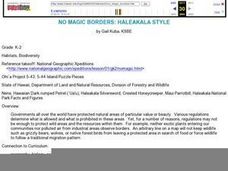Curated OER
Where are the Dinosaurs?
Students understand what it means when an animal is extinct. For this dinosaur lesson, students create dinosaur dioramas showing their habitat and what in their environment might make them become extinct. students pay particular...
Curated OER
Camouflage
Here is a lesson which incorporates ingenious hands-on activities that simulate how many animals use camouflage as a survival technique. This lesson clearly outlines how to implement the activities and discussion sessions found in it....
Virginia Department of Education
Weather Patterns and Seasonal Changes
Get your class outside to observe their surroundings with a instructional activity highlighting weather patterns and seasonal changes. First, learners take a weather walk to survey how the weather affects animals, people, plants, and...
Curated OER
Cells, The Structural and Functional Units of Life
Learners observe the general structure and organelles of plant and animal cells. Students prepare microscope slides of elodea, onion, check, and cork and identify the cells by size and shape as unicellular, multicellular, plant or animal.
Curated OER
Mallard's Wet Olympics
Learners investigate some of the different characteristics of living things. They make observations from reading and interactive media. Students observe that animals move in different ways and have adaptations to aid in that action.
Curated OER
Investigating Animals in Water
Students observe small animal activity. They identify local water animals and describe the habitats where water animals can be found. Students collect samples to observe in the classroom.
Curated OER
Blubber Gloves
Fifth graders examine animal adaptations and how they meet their needs in a variety of environments. They discuss how they might adapt to their own environment before discussing how an animal could adapt. Next, they complete an...
Curated OER
Traditional Stories about Wind
Students observe and talk about wind using no weather instruments. In this wind lesson plan, students use their senses to observe wind. They also interview an Elder about wind.
Curated OER
Dirt Life
Students select and collect soil samples from a variety of locations (schoolyard, home, etc.). They do this lab after an interest-generating discussion about "dirt" and microbes. Students make a dilution in sterile water, plate it on a...
Curated OER
Drawing Fish
Students practice creating art by imitating the camouflage of fish. In this animal characteristic lesson, students identify certain fish and their ability to change colors in order to survive in the wild. Students utilize coloring...
Curated OER
Animal Alphabetizing
Second graders observe a stack of folders, papers, notebooks or other materials that need to be organized. They discuss what the word organize means and then practice alphabetizing books according to first names of students as a class....
Curated OER
Biodiversity
Fifth graders visit the playground to look for signs of life. They search for insects, birds, animal tracks, feathers, nests, trees, soil, etc. They then compose a class list that shows all findings in the schoolyard and post it in the...
Japan Society
Our Family and Other Families: Using Totoro to Teach Family Structure
What do families around the world have in common? Explore this theme through the popular animated film My Neighbor Totoro by Hayao Miyazaki. Over the course of two days, pupils view the film, pausing to discuss their own families and the...
Curated OER
Insects!
Students explore the diet of insects. In this "insects" biology lesson plan, students take a nature walk and collect various natural materials they think may be eaten by insects. Students sort and classify these materials into three diet...
Curated OER
Cycles of Life in an Urban Habitat: Changes in Biodiversity
Second graders compare and contrast animate and inanimate objects. In this environmental science lesson, 2nd graders create simple food webs. They observe their environment and create a collage about it.
Curated OER
Explore Your Natural Habitat
Students identify habitats and understand why they are important to our environment. In this environmental lesson students design their own habitat, observe and record data on the impact their habitat has on the environment.
Curated OER
Hatching chickens
Students recognize the need for gentle care of eggs. In this chicken hatching lesson, students observe the process of incubating eggs for hatching. Students find the materials needed to properly care for the chicks. Students complete a...
Curated OER
Why Is My Bread Fuzzy?
Learners explore the organisms that live on counters or surfaces in the classroom. In this mold experiment, students observe mold in different conditons. Learners record their observations on a worksheet. Students understand how...
Curated OER
An Egg is Quiet
Students discover information about animal eggs by reading the book, An Egg is Quiet. In this animal science lesson plan, students research different animals to find out what their eggs look like. Students use a provided...
Curated OER
Endangered Animals
Fourth graders research different endangered animals in media center as part of unit on Earth Day, animals, and environment, create project based around multiple intelligence related to an endangered animal, and produce Powerpoint...
Curated OER
Nasonia Genetics-A Jewel of a Wasp
Learners investigate the inheritance pattern of eye color in Nasonia wasps. In this genetics and inheritance lesson plan, students read about the life cycle of Nasonia wasps and hypothesize about the possibilities of eye color inherited...
Curated OER
Mud Fossils
Students observe real fossils. In this science lesson, students make their own mud fossils by pressing material into the mud and letting it dry in the sun for 3-4 days. Students then get the fossils out displaying their mud...
Curated OER
Nature Superfish
Students study the behavior or ocean animals called billfish. In this life science lesson, students create their own documentary about a local animal. They share their videos with the entire school.
Curated OER
No Magic Borders: Haleakala Style
Students discuss borders and boundaries. They discuss pollution and the fact that boundaries cannot stop pollution and that pollution affects even protected wildlife and plants. They participate in an activity in which they must place...








